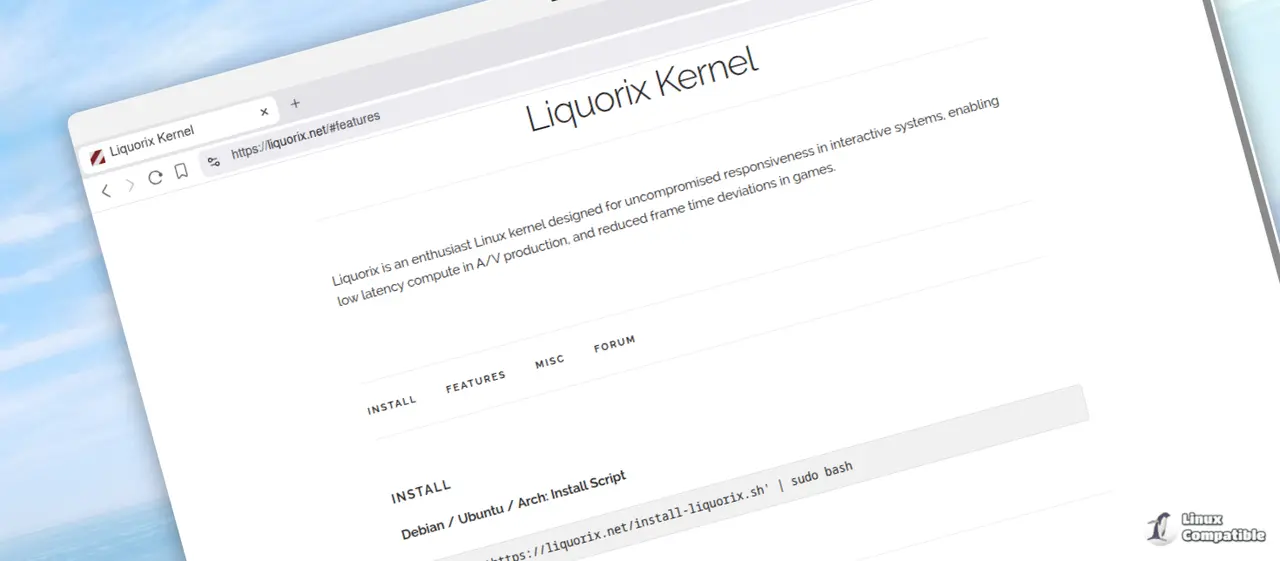The Liquorix kernel team, led by Steven Barrett, has announced the release of the Liquorix Linux Kernel 6.14-14, which is based on the Linux kernel version 6.14.11. The Liquorix kernel is specifically designed for enthusiasts and provides optimizations for low-latency computing, making it ideal for audio-visual production, gaming, and interactive systems. It is compatible with popular distributions such as Debian, Ubuntu, and Arch Linux.
- Advanced Scheduling: The kernel features a new default scheduler, BFQ (Budget Fair Queue), which is tailored for desktop usage, achieving high throughput with low latency.
- Improved Virtual Memory Management: Changes in the virtual memory subsystem include enabling background reclaim of hugepages and modifications to cache time-to-live settings.
- PDS Process Scheduler: A fair scheduler designed for gaming and multimedia applications, ensuring optimal performance for real-time workloads.
- High-Resolution Scheduling: A 1000 Hz tick rate allows for precise low-jitter scheduling of tasks.
- Enhanced Preemption: The kernel supports aggressive preemption strategies to maintain system responsiveness under heavy loads.
- TCP BBR2 Congestion Control: This feature optimizes network performance, offering faster speeds compared to the traditional Cubic algorithm.
- Compressed Swap: Utilizes LZ4 compression for swap storage, enhancing memory efficiency.
- Multigenerational LRU: This alternative LRU algorithm effectively manages memory under high pressure and extended uptimes.
For more information, users can visit the [Liquorix homepage](https://liquorix.net) or download the source code from [GitHub](https://github.com/Liquorix/Liquorix)
Key Features of the Liquorix Kernel:
- Zen Interactive Tuning: Enhances kernel responsiveness, albeit at the expense of throughput and power efficiency.- Advanced Scheduling: The kernel features a new default scheduler, BFQ (Budget Fair Queue), which is tailored for desktop usage, achieving high throughput with low latency.
- Improved Virtual Memory Management: Changes in the virtual memory subsystem include enabling background reclaim of hugepages and modifications to cache time-to-live settings.
- PDS Process Scheduler: A fair scheduler designed for gaming and multimedia applications, ensuring optimal performance for real-time workloads.
- High-Resolution Scheduling: A 1000 Hz tick rate allows for precise low-jitter scheduling of tasks.
- Enhanced Preemption: The kernel supports aggressive preemption strategies to maintain system responsiveness under heavy loads.
- TCP BBR2 Congestion Control: This feature optimizes network performance, offering faster speeds compared to the traditional Cubic algorithm.
- Compressed Swap: Utilizes LZ4 compression for swap storage, enhancing memory efficiency.
- Multigenerational LRU: This alternative LRU algorithm effectively manages memory under high pressure and extended uptimes.
Installation:
Users can easily install the Liquorix kernel on Debian, Ubuntu, or Arch by executing the following command:bashcurl -s 'https://liquorix.net/install-liquorix.sh' | sudo bash
Recent Updates:
The latest version, 6.14-14, includes the merging of changes from version 6.14.11 and updates the kernel version to 6.14.11-1.Conclusion:
The Liquorix Linux Kernel 6.14-14 represents a significant advancement for users looking for enhanced performance in gaming, multimedia, and interactive applications. With its optimized features and ease of installation, it remains a valuable resource for Linux enthusiasts.For more information, users can visit the [Liquorix homepage](https://liquorix.net) or download the source code from [GitHub](https://github.com/Liquorix/Liquorix)
Liquorix Linux Kernel 6.14-14 released
Steven Barrett has released a new Liquorix kernel derived from Linux kernel 6.14.11. The Liquorix Linux kernel is an enthusiast Linux kernel that is optimized for low-latency computing in audiovisual production, reduced frame time variations in games, and unparalleled responsiveness in interactive systems. It is available for Debian, Ubuntu, and Arch Linux.


